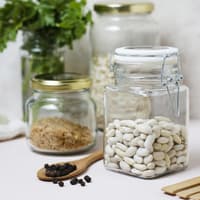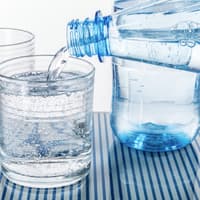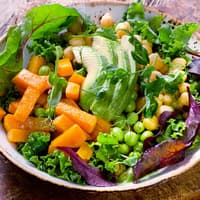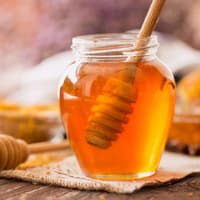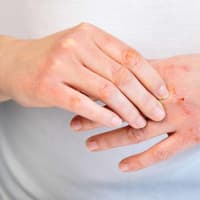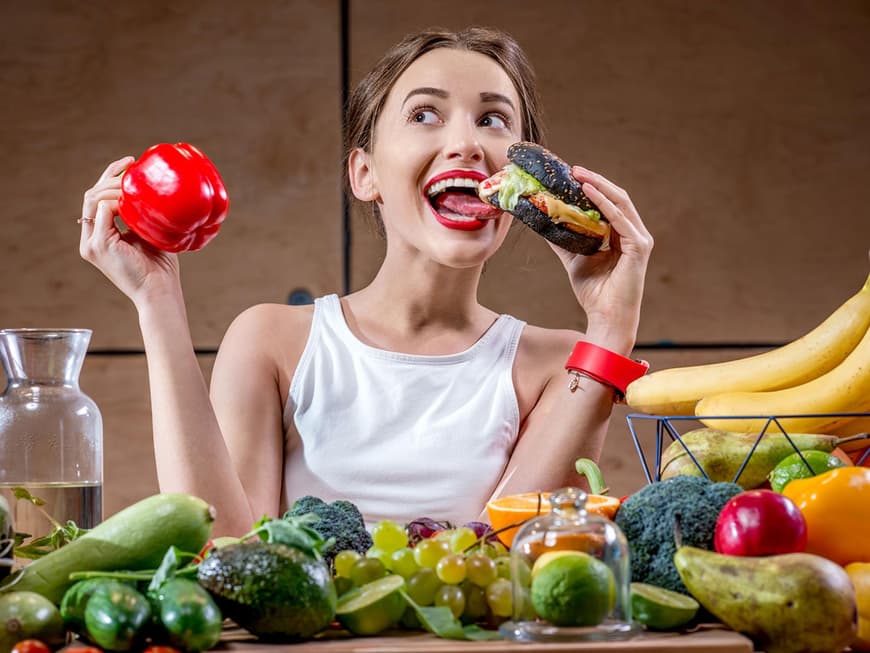
1 One warm meal a day is important
This wisdom is true. We don't necessarily have to eat something warm once a day to stay healthy. But because some nutrients are only released or utilized by our metabolism when heated and a warm meal guarantees greater variety and diversity on the plate, a warm lunch or dinner is good for us.
2 Advertising promises must be true for us
Basically yes, but be careful! For example, the EU regulation on so-called "health claims" stipulates that if a manufacturer advertises health claims, these must be scientifically proven. This is intended to protect consumers. In reality, the industry often uses health claims to give sugary cornflakes and yogurts or salty ready meals a better image by adding things like "vitamin C for a strong immune system", "protects cells" or "helps digestion". Artificial vitamins are added to the unhealthy food - and the claims are already legally ok.
3 Eating fruit and vegetables means eating naturally
That's not true - and that's a good thing. Many food plants are inedible or poisonous in their wild form and their genes have only been modified by breeding so that we can eat them. Cereals and vegetables in particular have been bred to be edible: The light-colored, inedible wild carrot only became orange-red, sweet and thick through breeding. Cucurbits such as cucumber, zucchini and pumpkin contain poisonous bitter substances in their wild form. Hobby gardeners in particular need to be aware of this, because if edible varieties mix with ornamental or wild plants through cross-pollination, toxic bitter substances can accumulate in the vegetables and make them dangerous to eat.
4 Too much gluten is harmful and makes you ill
The label "gluten-free" and the symbol with the crossed-out ear of wheat reinforce the myth of dangerous gluten (gluten protein). Gluten-free products are healthier? It's easier to lose weight without gluten? All nonsense! People without coeliac disease or gluten sensitivity only spend money unnecessarily on gluten-free products. Gluten does no harm.
5 When in doubt, you can rely on your sense of taste
Unfortunately not. In one study, researchers colored lemon Jell-O red and cassis-flavored Jell-O yellow. The testers were deceived by the visual appearance. Colorants awaken a certain taste expectation in us. The industry uses this knowledge and colors cheese yellow with beta-carotene, for example, as consumers associate this with good quality and the cheese supposedly tastes better.
6 Is tap water better than mineral water?
Yes, and for several reasons. It is the most strictly controlled foodstuff. In 2016, Stiftung Warentest confirmed that tap water is of better quality than bottled mineral water. Water from plastic bottles has been proven to be more contaminated with hormones that have dissolved from the PET material. Tap water is also better for the environment as there is no pollution from bottling plants, waste and transportation. And at 0.5 cents per liter, it's a real bargain.
7 Fructose is healthier than household sugar
This is wrong. Fructose is at least as harmful as too much granulated sugar. The only thing that is true is that some foods that contain it are healthy: fruit. But fructose is also obtained cheaply from corn and added to processed foods. Fructose inhibits the production of satiety hormones - which makes you fat. Too much fructose puts a strain on the liver and can increase the risk of bowel cancer.
8 Sugar alternatives also harbor many risks
This is true, for example, of agave syrup, which is touted as a healthy sugar alternative. It consists of around 90 percent fructose. This is anything but healthy. All other syrups should be used just as sparingly due to their particularly high fructose content. Only honey scores with small amounts of healthy enzymes and vitamins. Here too, less is more.
9 Our grandparents ate ideally because originally
In times when obesity and diabetes have become widespread diseases, there is a widespread misconception that everything used to be better. Our ancestors would have eaten a much more natural and original diet, straight from the field. This is only partly true. In the past, food was much more tampered with: spices were mixed with heavy metals, fruit was candied with arsenic compounds and flour was mixed with cheap leftovers. There were no refrigeration facilities and little was checked. If you inform yourself, you can eat better today.
10 The body already knows what it needs
Intuitive eating is the name of a current nutritional trend that is all about freeing yourself from recommendations, prohibitions and, above all, ritualized habits and listening more to your needs again. To do this, you must first learn to distinguish between genuine, purely physical hunger and cravings, e.g. for stress, delicious smells and visual stimuli. Then intuitive eating can make you slimmer and healthier in the long term.
11 Is drinking coffee good or harmful?
The myth: coffee makes you nervous, puts a strain on your heart and circulation and dehydrates your body. All nonsense. In the short term, coffee dilates the blood vessels, increases the heart rate and improves blood flow to all organs. The metabolic rate increases and the risk of gallstones decreases by 25 percent. Coffee has a digestive effect after a meal and is only a burden on an empty or sensitive stomach. Up to four cups a day is healthy.
12 Our body lacks something without meat
It is true that meat from species-appropriate husbandry is a good source of protein, vitamins and minerals and can contribute to a balanced diet. It is also true that too much meat and sausage makes you ill and increases the risk of intestinal diseases. If you eat a balanced diet of vegetables, fruit, eggs, wholegrains, nuts, pulses and dairy products without meat, you won't be missing anything. According to the DGE, a purely vegan diet is problematic, as there is a high risk of nutrient deficiencies.
13 Nutrients are destroyed in the microwave
Wrong. Microwaving does not destroy any more nutrients than heating on the stove. It is often even gentler. According to the Federal Office for Radiation Protection, the widespread misconception that food is contaminated has not been proven in any serious study.
14 Popular, but unhealthy? Ready-made products under scrutiny
Ready-made products - so-called convenience food - from the supermarket make our everyday lives more convenient and save time. But when we reach for a bag or can, we also give up control. We don't know exactly how much sugar, hydrogenated fats and additives end up on our plates.
we don't know exactly. Nevertheless, not all ready-made products are unhealthy.
Frozen fruit and vegetables: Highly recommended. Shock freezing directly after harvesting preserves the nutrients and taste. This also applies to frozen herbs.
Frozen vegetable dishes: Recommended. Vegetarian frozen dishes such as creamed spinach, buttered vegetables and Asian stir-fries have predominantly favorable fat and nutrient values.
Pesto: Recommended if the jar says "without preservatives" and "without flavor enhancers".
Fresh dough pasta and pizza: Recommended. Usually do not contain preservatives.
Frozen fish dishes: Still recommended - with a fat content below 10 percent.
Salad mixes: Still recommended if the salad is eaten well before the best before date and washed beforehand.
Canned food: Different. Fruit loses vitamins and is preserved with a lot of sugar. Vegetables also lose too many vitamins. Exceptions: Canned tomatoes score points for taste and high lycopene levels (protects cells). Pulses (except peas) still retain valuable iron and B vitamins.
Frozen pizza: Less recommendable. Far too high in fat. Often with additives.
Vegetable sticks: Not recommended. High in fat and usually with more mashed potato than vegetables.
Complete meals: Not recommended unrefrigerated, as many additives are needed to preserve the product. Frozen meals are better here. But: Almost all of them contain too much salt, sugar, fat, aroma and flavor enhancers.
Canned and instant meals: Not recommended. The whole chemical laboratory with flavor enhancers, aromas and colorings is used to compensate for the loss of taste when drying the few "real" ingredients.

